“Nature is crooked, nature is dirty, nature is spotty. That’s part of life.”
It’s Friday afternoon and I’m walking through a completely empty FH Münster – you can feel the semester break. And maybe also a little Corona.
Actually, I am a participant of a conference of the Citizen Circle – a community of location-independent working people. But I also had the chance to interview Prof. Guido Ritter and Wieland Buschmann.
I had found their podcast „Klausurrelevant! – the podcast on nutritional science”, when I was looking for information about the Planetary Health Diet [1].
Two Oecotrophologists (nutritional scientists), two Hessians, two generations, two roles, and it’s all fun and eye-opening. I had to get to know these two! So I did send them a message asking if I could interview them. They agreed immediatly.
Guido first shows me around the premises with great enthusiasm. First the sensory lab, where food is tasted by testers and sensory experts are also trained. There are small booths with a chair, tabletop, screen and a sliding wall to the test kitchen. The foods to be tasted are prepared there. For example, different yogurts, wines or even different colored potatoes. The light in the booths can be adjusted, to red or blue. This makes the food look different and the attention of the test eaters can be better directed to the taste. Or with red wine, for example, the color can be concealed so that a wine that is slightly brownish in color does not influence the taste perception
I am also allowed to visit the food lab. Here there is a wall on which many student projects can be read that are currently taking place or have already taken place. There is also a small press for pressing apple juice and a centrifuge for extracting the university’s own honey.
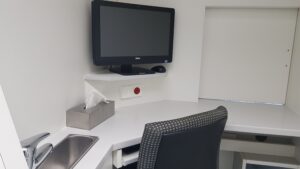
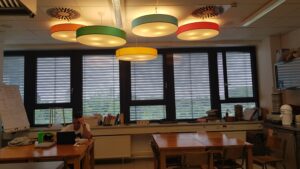
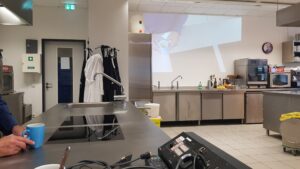
Wieland joins us after a while and we go to Guido’s office.
Corona-style, we sit at a distance around the table. I unpack my cell phone and start the audio recording for the interview. We talk a bit about the podcast and suddenly Guido says, “We’ll just record that too, we’ll make a podcast episode out of it”[2].
Everyone agrees and so we talk a bit about another topic. The new Podcast is to be about the topic “Trimm dich Pfad” which is an early german version of freeletics, meaning doing sports and specific exercises outside with little or no infrastructure. The very first of these outdoor sports trails was created in the 70s in Münster, of all places!
After having discussed this, we then move on and all my questions are answered – here now the interview.
StS: “You’ve been doing this podcast now since 2020 – which episode was your favorite so far?”
Guido: “I have several favorite episodes. But what I really liked was the episode about eating entrails, innards and giblets, because it brings back so many memories for me. Also because it triggered so many emotions for me and it’s a controversial topic. We got a lot of very personal feedback. People wrote us long e-mails about what role it played in their lives. I found that moving for me, because it seems to have triggered something in a lot of people.”
Wieland: “That’s right, it was interesting for me, too because I hadn’t had much contact with eating entrails, innards and giblets before [3]. It was very exciting for me because it seems to be a taboo subject, and I thought it was cool to talk about it. I also found it exciting that there was feedback from fellow students. In rural areas, it’s quite normal to eat offal.”
Guido: “Actually, all episodes are fun, but this one was especially fun for me. And that’s how we measure our success – whether we enjoyed it. And not so much by any click numbers.”
Wieland: “My favorite episode was just recorded recently, episode #24 Oecotrophological – Diving into the world of Oecotrophology, because many of my fellow students simply don’t know what all you can do with this great degree. Or can’t make up their minds. You have to get active. Because if you’re an Oecotrophologist, you could do anything. In the first place an Oecotrophologist could be understand as a nutrition expert. But it is so much more. I could be a blogger or an influencer. But I could also do nutritional counseling for diabetics, or become a product developer. Or I could go to a roasting company and develop roasting profiles, and so on. The degree program makes a lot of things possible, but some students are also overwhelmed by it.”
StS: “How did you guys actually come up with the podcast?”
Guido: “At the end of 2019, we were sitting together in the beer garden. I ate an incredibly big plate with a lot of meat, it was called “Bud Spencer memory pan” (laughs). I’ve learned that when young people sit together and make a joke, at some point they say, ‘Gee, let’s do a podcast about that.’ My generation used to take a trip around the world. It’s an insane idea that you don’t really go through with. But last year we said to ourselves, we both have so much to tell each other, if we just recorded it, it would probably be entertaining. Here in the study of Oecotrophologie it is not only about what we eat, but also how and why. And then we just started a podcast.”
StS: “And you’ve been doing that for 1.5 years. There’s no end in sight yet, is there?”
Wieland: “No, there’s no end in sight. We simply don’t run out of topics, and we’re always getting new ones from our listeners. In the beginning, we didn’t get that many letters, but then we asked. And we got a lot of responses. A colleague here from the University we work at also once came with a long list of topics.”
Guido: “Corona in particular has also played a role in this. And as Wieland said, we really don’t run out of topics.”
StS: “So in what ways did Corona play a role or change our relationship with food?”
Wieland: “It was strange that flour, yeast, sugar and things like that were suddenly sold out at the beginning of Corona. We made a podcast episode about it, because sourdough bread suddenly had a renaissance. “
StS: “Yes, that’s right, I actually also baked sourdough bread. And then in the U.S., people tended to bake banana bread.”
Guido: “Exactly, you could try out what you always wanted to do. And I briefly had the feeling that the lifestyle was changing somewhat. But that’s probably not sustainable. It’s simply a matter of habit. Now, fortunately, restaurant visits and more communicative eating are possible again, less isolation. During Corona, some women probably reverted to a housewife role. The gender roles were much more classical again. Hopefully that is improving again now. What remains is regionality. Because we have noticed that the supply chains are fragile. I think there’s also been a push toward appreciation, because suddenly not everything was available.”
Wieland: “What is no longer being discussed at all is this scandal at Tönnies[4].
– when suddenly there were high numbers of corona cases in this meat-processing company. And people thought about the working conditions. Many people wondered whether a lot of cheap meat was a good idea. People are suppressing it. When I buy salami, I don’t see the worker or the animal. I don’t see how much suffering there is in the background. That came up briefly, but now it’s no longer an issue. You don’t even know: has anything changed at Tönnies now?”
Guido: “Yes, it is no longer so present, because of course other things are happening, such as the flood disaster in the Ahr Valley, in Germany. But I think that meat consumption is going down, that more people are becoming flexitarians. Things are developing that can no longer be reversed. That it is becoming more normal to eat vegetarian or vegan food, even in restaurants. There are now fewer dogmas associated with it. Much to it contributed that vegan is called now “plant based”. People give it a name, tell a story. And there I find “plant-based nutrition” super. So overall, yes, there has been some change in our diet through Corona. But I was hoping for more improvement. “
StS: “Meat consumption is an exciting topic, because it doesn’t just have an impact here locally. It’s not just about animal welfare or animal suffering. Nor is it just about the workers here in Germany. It’s a much bigger issue that also has a lot to do with global food justice. For example, the question of where does the animal feed come from. How much is wasted. How much food doesn’t even make it to the supermarket. Or not even to the plate. Against the backdrop of Fairtrade, that’s another important topic for me. Wieland, you helped develop the Simsimballs. Can you tell us a few details about that?”
Wieland: “That was a product from the Foodlab, which you saw earlier. The basis was my contact with Lichtstrahl Uganda e.V. here in Münster (https://www.lightray-uganda.org/ ) . The project deals with a village in Uganda. There, within 10 years, various things were built. For example, a maternity hut where women can have their children in a protected environment. There is also a children’s house, schools, an infirmary, a laboratory with malaria and HIV testing facilities and so on. It’s a great project that has grown and grown over the years with a lot of volunteer work and donations. I went to an event. There the chairwoman Heike Rath said: “Contact us if you still have ideas for our project in Uganda”. And I thought to myself, as an oecotrophologist I have the opportunity and the responsibility to do something there. The children there are sufficiently supplied with calories. But a big problem is the lack of nutrients, such as iron or calcium. In English, this is called “hidden hunger.” So we first developed a porridge, because it’s easy to make. It was bone-broth based. It evolved to the simsimballs. This is a kind of energy ball that you can sometimes get in cafés today.
This ball shape has the advantage that I don’t need a plate and above all I have a different sensory experience. The simsimballs consist of 5 simple ingredients: sesame, banana, peanut, millet and orange. I developed this in the foodlab with my colleague Jolien. The name is inspired by the trend of energy balls and Simsim is the Ugandan name for sesame. We won €10,000 in a competition. With the money we were then able to implement the project. We were able to finance flights from the money. We were able to show the recipe to the women and children in the children’s home. And also buy the ingredients for the first months. Now we have bought a piece of land to grow the ingredients ourselves on site. This will take a little while, but it is sustainable. That was really nice to see that you can actually help children in precarious situations by studying here.”

Guido: “This is a great example of true sustainability. Often, by sustainability, we mean that future generations will be able to meet their needs the way we do. And that’s usually where the definition stops. But Brundtland’s actual definition from the original goes further. It says that needs are understood to mean what the poor in this world need. That it is also about making sustainability fair and not only about a “future fit for grandchildren”[5].
And your Fairtrade approach takes care of exactly this broader definition. I would say 90% of the people involved in sustainability don’t even know that this aspect is also included in the definition5. We here at the Institute for Sustainable Nutrition have also become aware of this issue in recent weeks. Because we now want to support a project where someone in Brazil is growing oranges. And then one region is supposed to produce the supply for another region. They don’t have enough oranges really to get a fair trade seal. Competing with the big players in the industry, they don’t stand a chance. But now this region in Brazil becomes a direct trading partner with Münster. That can work. As you say, building partnerships, building trust, thinking long-term, taking people seriously. It’s not about building a well, it’s about experiencing together. There’s a lot that can be done in the food sector, and the Simsimballs are a very good example.”
StS: “I think the Simsimballs project is great! What I always find difficult about development aid is when technology is brought from the supposedly developed world to the supposedly underdeveloped world. And then, best of all, still make profits here. For example, the classic well construction in Africa by a German company, which then earns money from it. I always find that problematic. Whereas this is a transfer of knowledge. That’s what excited me. You simply say: we have the FoodLab here, we have the knowledge and we develop something for your needs. And then just bring the knowledge there and a little bit of seed funding so it can be implemented. After that, they can do everything on their own locally and don’t need anything more from us.
And what you just said, Guido, about the oranges from Brazil to Münster, that is in principle a special form of direct trade. When I think of Brazil, I also think of the TodaVida project (link: https://todavida.de/ ), which is reforesting the rainforest and also planting edible crops. Also an exciting project. My feeling is that these forms of trade are just increasing, for example also in the form of “Relationship Coffee” [6]. With this kind of trade, you get more of a feeling for the producer again.“
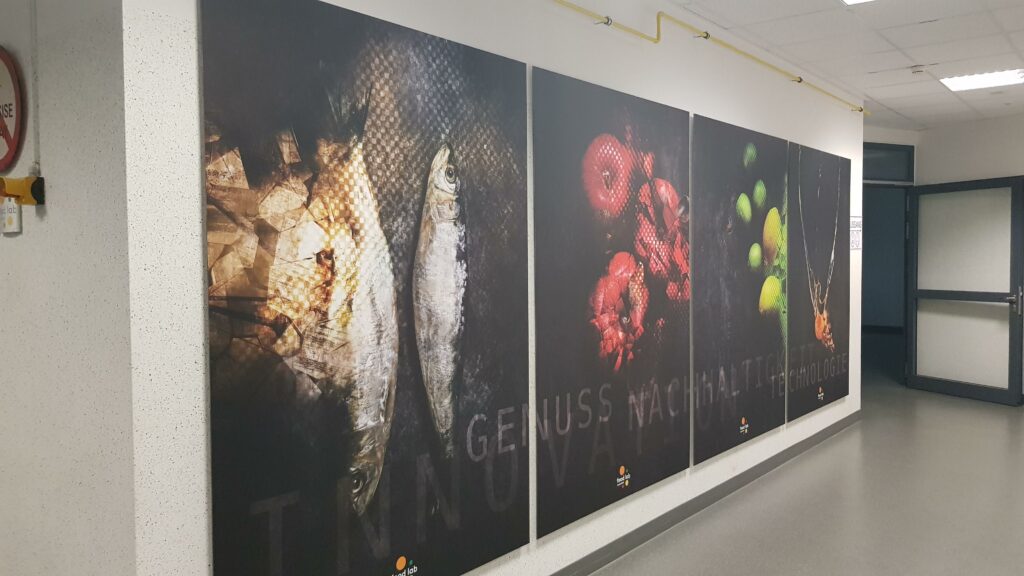
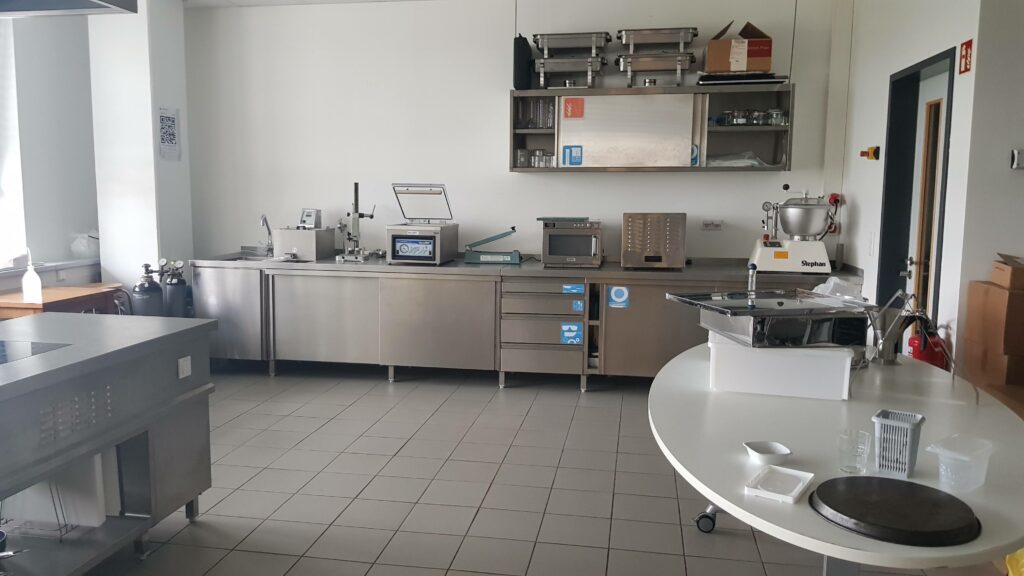
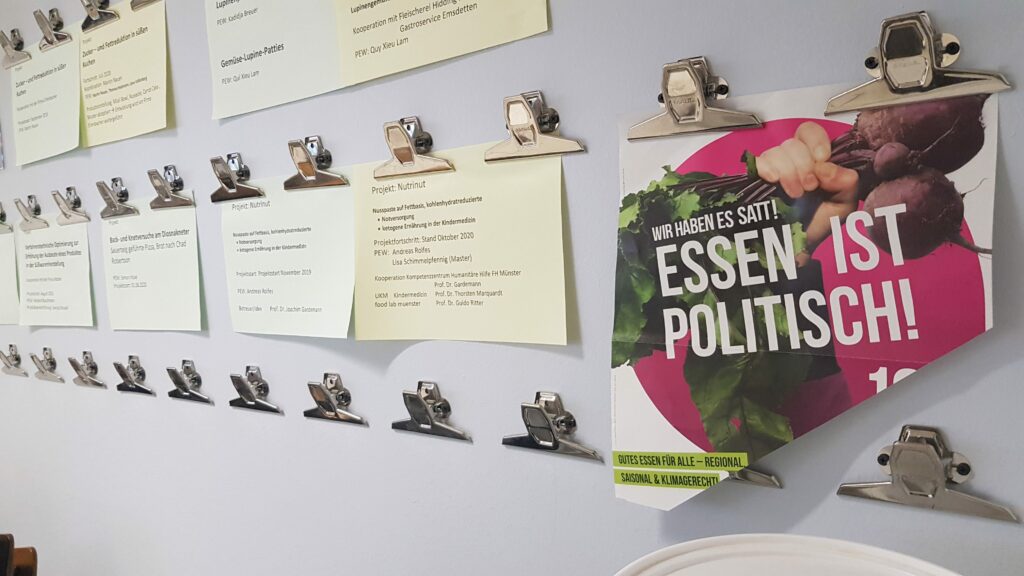
Wieland: “Yes, that is an issue. I work in a roastery as a quality manager. The challenge with direct trade is that there is no label. So you need long-term relationships, trust with the producers, and also the customer has to trust you. And actually, that only works if you have quality management on site – people who control it in the producing country. And that’s often an easier way to trade for smaller roasters.”
StS: “What do you think about Specialty Coffee?”
Wieland: “An exciting thing. But it will remain a niche product because the taste is too special.”
Guido: “Nature is simply subject to fluctuations. Perhaps we as consumers would have to accept again that things sometimes taste different. We’re so used to everything always tasting the same. That’s a shame because it robs us of variety. Nature is not standardized. Nature is crooked, nature is dirty, nature is spotty. That’s part of it. This standardized, sterilized food is boring, too.”
Wieland: “We also had that topic on the podcast episode about the old varieties. That a lot of things are being rediscovered there and are very exciting.”
Guido: “To come back to your topic of fair trade or justice. Standardization also means that sometimes you lose something that would have been worth preserving. More naturalness is demanded. But nutrition has a lot to do with habit, and for years we have been making standardization a habit. But as I said, it’s just boring and sometimes we want to define ourselves by our individuality. And then you come to specialty coffee, then you come to old varieties. And sometimes you come back to bitterness, which has been bred out for a long time. Sometimes you don’t miss it until it’s gone.”
Wieland: “I once found the Slowfood Ark list of species worth protecting. There are old species and breeds in there, like the bunte. Bentheimer pig. And it said ‘You have to eat what you want to protect. Otherwise it will die out. I thought that was a great sentence.”
StS: “One last question: if you had just one tip to improve nutrition (globally, regionally, and individually). What would be the one thing that would do the most good?”
Wieland: “One thing immediately comes to mind: Education! In preschool, in school. Then you know where the sausage comes from. And when you try a tomato that looks different, when you learn to cook, then you have a different attitude toward nutrition. And then the whole thing becomes more sustainable.”
Guido: “I would go a little further. Not just show – let’s do. Really cook for yourself in concrete terms. That has to do with a whole lot of aspects of education. Life has to be a bit uncomfortable for it to be fun. Nutrition is a central point that will decide what the future will look like. And whether we will have good opportunities to continue living! It is not about restrictions. It has long been decided that we have to have climate protection. It is only a question of the fact that it must happen now. Otherwise, bondage will come. We will no longer have a choice. Because then we’ll have to spend money on dams, for example. So we have to follow some rules now, which are common sense. And you have to do it yourself from childhood and experience it yourself. Then it becomes a habit and can be passed on to the next generation. So: deal with the topic of nutrition, cook yourself, invest time. We all have enough time and just have to decide what to do with our time. Growing your own food, cooking your own food, eating together – that also has a lot to do with communication. Otherwise, it’s important what happens at the beginning of the chain. Things should be grown locally so that local people have fair opportunities. Every decision we make, including food, is political and has an impact. The gap between rich and poor in the world is widening dramatically, but we also have a little bit of control over it. It also has a lot to do with social norms, but also enjoyment. And each of us has a chance to make a difference. “
StS: “I hear an appeal to personal responsibility. But also a support of organic and fair trade farming. Thank you for your time, the many insights into your work and the interview!”
Wieland: “You’re welcome.”
Guido: “Thanks for being here and putting us through the wringer.”
On the way out, Guido gives me a glass of jubilee honey and a bottle of mead – both products made by students at the university.
I am grateful for so much openness and donated time!
You can listen to the complete interview as a podcast at Klausurrelevant (in German) :
https://fh-muenster.de/oecotrophologie-facility-management/aktuelles/klausurrelevant-podcast.php?episode=47 and here https://podcasts.apple.com/de/podcast/26-wieland-und-guido-in-der-mangel-interview-mit-stefanie/id1512161507?i=1000533478624
[1] Find the podcast here: https://podcasts.apple.com/de/podcast/06-planetary-health-diet-ein-gesunder-mensch-isst-auf/id1512161507?i=1000485453619 and here: https://fh-muenster.de/oecotrophologie-facility-management/aktuelles/klausurrelevant-podcast.php?episode=22
[2] https://podcasts.apple.com/de/podcast/26-wieland-und-guido-in-der-mangel-interview-mit-stefanie/id1512161507?i=1000533478624, https://fh-muenster.de/oecotrophologie-facility-management/aktuelles/klausurrelevant-podcast.php?episode=47
[3] https://podcasts.apple.com/de/podcast/02-innereien-frei-von-der-leber-weg/id1512161507?i=1000475678719 , https://fh-muenster.de/oecotrophologie-facility-management/aktuelles/klausurrelevant-podcast.php?episode=17
[4] https://www.fr.de/politik/clemens-toennies-corona-ausbruch-ohne-skrupel-erfolg-13811365.html
[5] Definition of sustainability (in german) https://www.nachhaltigkeit.info/artikel/brundtland_report_563.htm
[6] E.g Interview with Felipe of “La Finca” coffee: http://fairtradejourney.sifastammtisch.de/2021/08/19/elementor-1485/


